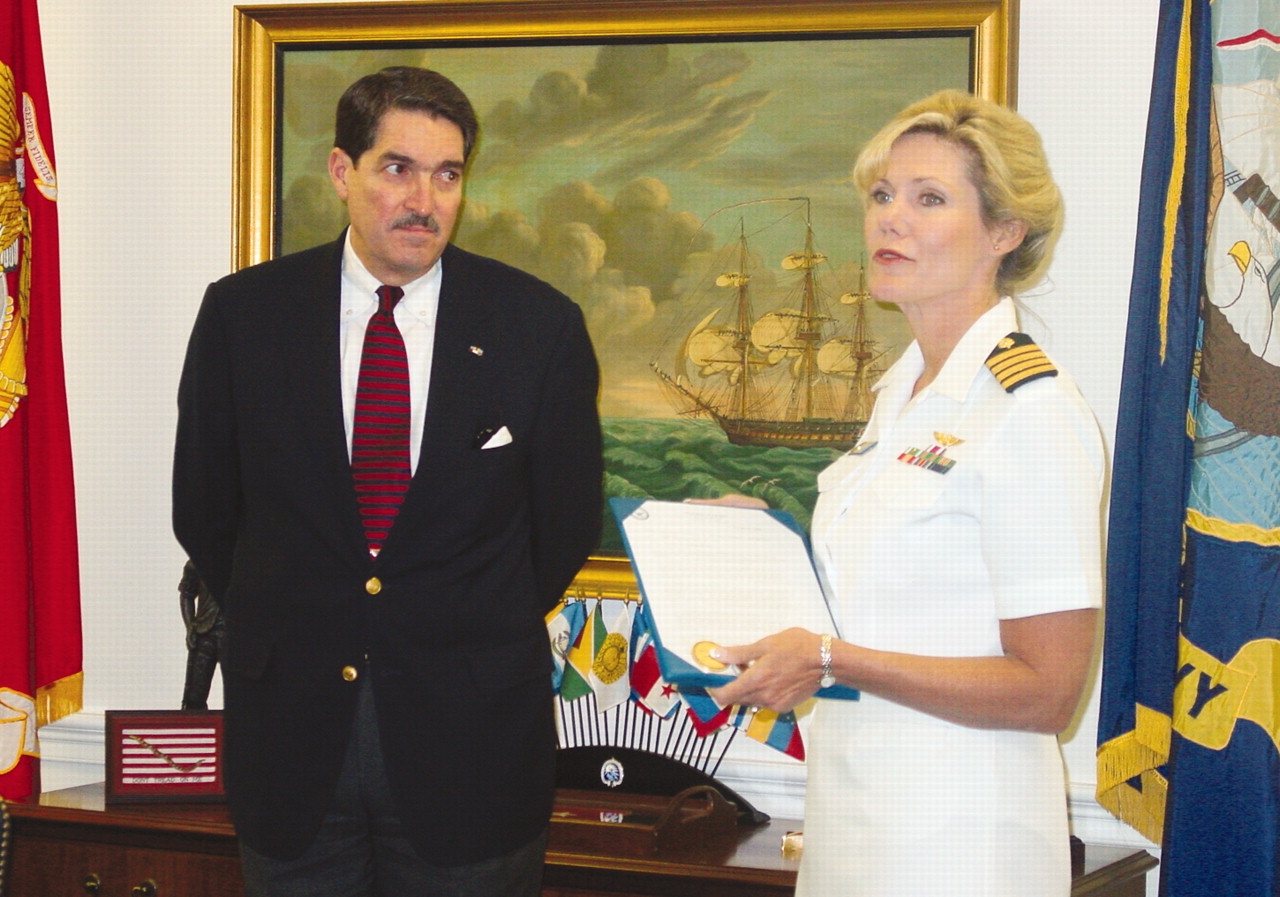For Capt. Jennifer Berg, M.C., U.S.N., a career naval officer and APA distinguished fellow, serving in the military is a family tradition. Her father had been an Army medic and her mother a staff sergeant in the Women's Marines during World War II, Berg told Psychiatric News.
Berg's mother suggested that she enroll in the Army Reserve Officer Training Corps in college, which led to a three-year scholarship. Upon graduation in 1980, she entered medical school at the Uniformed Services University of the Health Sciences in Bethesda, Md. In exchange for her medical education, Berg agreed to spend the next seven years of her medical career in the Navy, the branch of the military she switched to in medical school.
Her first foreign assignment was at a Navy base in Newfoundland, Canada.“ I didn't want to go, but once I got there, I had a wonderful time as a young physician taking care of families and children,” said Berg.
During her next assignment, in Pensacola, Fla., she enrolled in aerospace medicine training and became a flight surgeon. “I always thought it would be exciting to fly jets and land on aircraft carriers even if I was in the backseat,” said Berg. She explained that her flight surgeon training included solo flying in case of emergencies.
“It was a wonderful experience to work with an elite group of motivated professional pilots and to be accepted as their flight surgeon,” said Berg. “I increasingly recognized how psychological issues affected occupational functioning and quality of life. A large part of my job was helping pilots decide how to cope with personal and family issues so they wouldn't be distracted while flying.”
She decided to pursue residency training in psychiatry at the Naval Medical Center in San Diego, which she completed in 1993. The Navy paid for her training in exchange for three more years of service.
“In addition to free schooling, I also received a salary during medical school, my internship, and residency training,” said Berg.
She moved back to Pensacola, Fla., to work as a psychiatrist at the Naval Aerospace and Operational Medical Institute. There, she conducted research on personality styles and teamwork skills of successful aviators. She and her colleagues administered a personality survey to 312 successful aviators and found that the younger, less-experienced aviators were more dogmatic and less team oriented and open socially than older, more-experienced aviators.
“This combination of traits in junior aviators could suggest less openness to crew input and increased risk of mishaps,” the authors stated in the abstract of their study in the June 2002 Aviation, Space, and Environmental Medicine Journal.
Berg also became a member of the Astronaut Selection Psychological Support Team. “We have interviewed applicants for each mission since 1994. We evaluate their teamwork skills and ability to withstand extreme isolation and stress,” Berg said.
Although she was still enamored of aviation, Berg, the mother of two young children, wanted a more stable career track. She returned to the Naval Medical Center in San Diego in 1996, where she has held several positions including director of outpatient services, psychiatry residency program director, and most recently, clinician manager of mental health services and chair of psychiatry.
A challenging aspect of being a clinician manager has been responding to official requests from other commands to send them a psychiatrist on short notice for three to six months. “I selected the psychiatrist and then notified the person about the deployment. If the individual became upset or suggested another clinician be deployed, I always listened to make sure I had made the right choice. Emotionally, it was challenging, because there was a chance the person could be injured or killed,” said Berg.
Balancing work and home became more challenging as Berg progressed in her career, especially in the five years before she was promoted to captain in 2000. “Because promotions are competitive, I took on a lot of projects and worked long hours, which took time away from my children,” said Berg, a divorced single parent.
During her Navy career, Berg said she was never sexually harassed or discriminated against because of her gender. In fact, she noted, “I found being a female flight surgeon was an asset—male pilots were more likely to confide in a woman than another man because of the macho culture that still existed in the Navy.”
Berg was mentored mostly by men because women psychiatrists in the Navy were rare a few decades ago. “My male mentors were supurb,” she said. Nonetheless, she continued, “it's very important that women psychiatrists make a real effort to mentor young women during their medical training so they'll know all their career options.”
Berg would have happily continued her professional career in the Navy for several more years if she hadn't been seriously injured in an automobile accident in 2002. Now experiencing chronic pain daily, she will retire in October after 20 years of service as a physician.
“I have loved every minute of my time in the Navy. I doubt I would have advanced my career so quickly and done so many fun, interesting things as a civilian,” said Berg.

